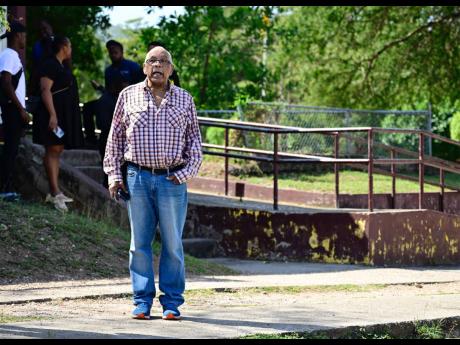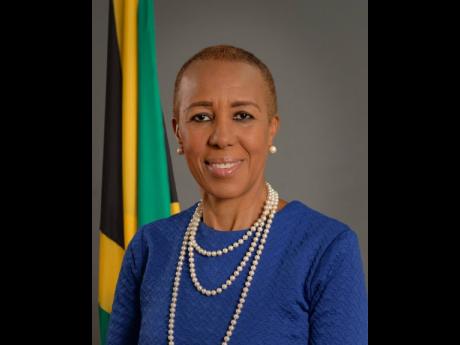Fayval Williams | Dr Davies is out of touch
Like all of us, Dr Omar Davies is a product of his times. He sees the world through the lenses of his experiences, some of which, for the sake of Jamaica, we pray are never repeated. This does not disqualify him entirely, but it puts his musings into perspective. While, from his Op-Ed in The Sunday Gleaner, it would seem as if he hasn’t changed, the world has certainly moved on from his times.
In referencing the IMF’s relationship with Jamaica, Dr Davies relates some of his experiences with the IMF, which we take at face value. Some of his descriptions are certainly supported by the enduring image of the late 1990s era IMF Managing Director, Michel Camdessus, hovering over Indonesian President Suharto, as the latter signed unto an austere IMF Programme in the era of the Asian Financial Crisis. Notwithstanding that this IMF programme swept away “monopolies, subsidies, tariffs, and tax breaks for pet projects”, which held the Indonesian economy back, the symbolism of the image was powerful. And symbols matter. The interpretation of the image screamed that this was not Indonesia’s choice. It was externally imposed. Today, Indonesia is a powerful member of the G20, with a thriving, dynamic, and high-growth economy. Despite the humiliating image that captured the signing of that 1998 IMF agreement, Indonesia is much better off today due to the reforms pursued under that IMF programme.
Dr Davies wrote with misplaced pride about ending the borrowing relationship with the IMF in 2005 while Jamaica experienced chronic macro-instability. History will, in time, if not yet, see that as an error. Jamaica was in an economic crisis long before 2005, which the then government failed to address. The house was on fire, and there seemed to be little urgency. Sure, having the IMF help Jamaica sort out the imbalances in 2005, or before, would have been politically costly. However, given the gravity of the problems, and the impact on opportunity, greater political maturity should have been applied. Time has shown that with the technical and financial support of the IMF, and with political will, these problems were solvable. History is, therefore, also likely to conclude that it was a reckless abdication of responsibility for Dr Davies to stubbornly leave that mess for future generations.
RELIES ON LABELS
Dr.Davies’s Op-Ed relies on labels such as “Washington consensus” and avoids discussing macro-economic conditions in 2005. As such, Jamaicans are less interested in his labels. They do not want to be in a position where their tax dollars are gobbled up in interest payments. They do not want high unemployment or an unstable economy.
Dr Davies cut the borrowing relationship with the IMF. Jamaica’s economic policies were unsustainable and deeply damaging to the people. At the end of 2005, Jamaica had completed a decade of outlandish fiscal deficits that averaged just under five per cent of GDP, with little to show for it, and debt/GDP was over 134 per cent. Interest costs insanely consumed 17 per cent of GDP and accounted for 70 per cent of tax revenues, leaving little resources for other critical priorities. Some of our more intractable problems today can be directly traced to the underinvestment of that time and before, as sadly, interest costs devoured the vast majority of budget resources.
Inflation in September 2005 was 19 per cent and ended the year at 13 per cent. One could not adequately plan for the future, so thinking and actions were short term. The unemployment rate was 11 per cent. Public bodies could not pay statutory deductions on employee wages and so racked up tens of billions of obligations to the tax authorities, which, eventually, had to be written off. Meanwhile, the Bank of Jamaica, suffocating under the weight of the fiscal mess, tried to prop up the Government, at its own expense, by maintaining a high double-digit policy rate and suffered losses of US$120 million between 2004 and 2005, eroding its capital base. Also, it was during this time that we were told to celebrate interest rates of 12 per cent on Jamaica’s Eurobond US dollar issues. It was an economic environment akin to madness.
If Dr Davies had decisively addressed the obvious unsustainability of the Government’s fiscal and monetary policies, an entire generation of young people would have had more opportunities. Instead, they have had to spend its most productive years paying the steep price for the major economic policy errors and omissions of the past.
Thankfully, beginning with the Bruce Golding administration, the successive governments responded with action to the reality that Jamaica was on a path to certain economic ruin. The society demanded a monitoring and oversight role of the 2013 IMF programme after earlier sacrifices seemed to have gone in vain.
COMPLETED FOUR PROGRAMMES
Fast-forward to today and Jamaica has now successfully completed four programmes with the IMF: an extended fund facility, a precautionary standby arrangement, a resilience and sustainability facility, and a precautionary liquidity line. Across all programmes in this 2013 - 2024 period, all structural benchmarks and all quantitative targets have been met.
Moreover, interest costs have been significantly lowered and now represent approximately five per cent of GDP or 15 per cent of tax revenues. These ratios will be even lower in years to come. As such, infrastructure and human capital development can now expand at a faster pace. Debt/GDP is on track for the high 60s at the end of this fiscal year; unemployment is five per cent, which is near its historical low; inflation registered an impressive convergence to return to the target band and is now five per cent; per capita GDP is up 40 per cent. The Bank of Jamaica is profitable, the policy interest rate is in single digits, and the central bank has adequate reserves. In a nutshell, Jamaica is economically stable.
In light of all of this progress that Dr Davies’s article, while admittedly graciously complimentary of Nigel Clarke, is otherwise an unfortunate piece. Dr Davies grossly misrepresents the Jamaica-IMF relationship of today and seeks to project unto us his experiences as if they were our own.
These IMF agreements became successful, to a significant degree, as they became ‘Jamaica’s’ agreements, not the ‘IMF’s’ agreements. Business, unions, civil society owned the agreements and held the Government’s feet to the fire to ensure that they were implemented. IMF representatives, and leadership, engaged with stakeholders, including the Opposition, participated in many public fora, listened, and explained.
So, Dr Davies, the world has moved on since your time. The IMF changed and Jamaica has also changed. Though fiscal rectitude is non-negotiable for the Fund, this is not your 1990’s IMF as is widely acknowledged internationally and as Jamaica’s experience demonstrates.
Finally, Dr Davies, in his article, puts up straw arguments. We do not expect Nigel Clarke as IMF deputy managing director to, as he wrote, “wield influence on Jamaica’s behalf to obtain special treatment”. Frankly, Jamaica doesn’t need special treatment. We are much more resilient today, internationally credible, and have policy options.
Jamaica staged one of the quickest recoveries from the COVID-19 pandemic in growth and jobs and is one of few countries where debt is also lower than before COVID-19. And so the tables have turned: the world is interested in, and wishes to learn from, the Jamaican experience.
From the vantage point of 2005, this would seem implausible and would be extremely difficult to comprehend. Dr Davies’ Op-Ed does not portray an understanding of this fact either.
We celebrate Dr Clarke’s appointment to the IMF – it is a powerful and global symbol of Jamaica’s success. After all, symbols do matter.
Fayval Williams is the minister of education and youth and member of parliament for the St Andrew Eastern constituency. Send feedback to columns@gleanerjm.com.


